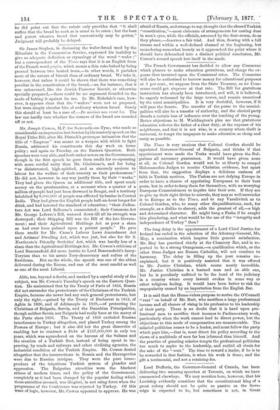The French Government has decided to allow any Commune which
pleases to make education gratuitous, and charge the ex- pense thus incurred upon the Communal rates. The Commune will also be authorised to borrow money for educational purposes at 3 per cent., we suppose from the State Treasury, as no Com- mune could get sixpence at that rate. The Bill for gratuitous instruction has already been introduced, and will, it is believed, be eagerly welcomed by the large towns, and remain unnoticed by the rural municipalities. It is very doubtful, however, if it will pass the Senate. The transfer of the purse to the munici- palities will also be a transfer of authority, and the clerical party dreads a certain loss of influence over the teaching of the young. Better objections to M. Waddington's plan are that gratuitous education relieves the father of a clear duty, at the expense of his neighbours, and that it is not wise, in a country where thrift is universal, to tempt the taxpayers to make education as cheap and nasty as possible.






































 Previous page
Previous page